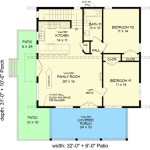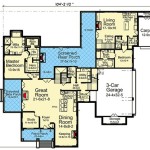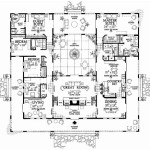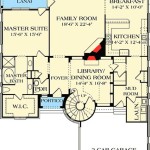Home Floor Plan With Dimensions
When planning to build or renovate a home, it's essential to consider the floor plan. A well-designed floor plan can optimize space, improve flow, and enhance the overall functionality of your living space. One crucial aspect of floor plans is incorporating dimensions, which provide precise measurements and allow for accurate planning.
Dimensions on a floor plan typically include the length and width of each room, as well as the distance between walls, windows, and doors. These measurements are crucial for determining furniture placement, traffic flow, and ensuring that the home meets building codes and regulations.
Here are some of the key benefits of using dimensions on a home floor plan:
- Accurate Planning: Dimensions allow for precise planning, ensuring that furniture and appliances will fit comfortably in each room without overcrowding or blocking walkways.
- Optimized Space: By incorporating dimensions, designers can optimize space utilization, maximizing the potential of each room and minimizing wasted areas.
- Improved Flow: Dimensions help create a smooth flow throughout the home, ensuring that traffic can move easily between rooms without any bottlenecks.
- Compliance with Codes: Dimensions on floor plans are essential for meeting building codes and regulations, which often specify minimum room sizes and clearances.
- Efficient Construction: Dimensions provide contractors with precise measurements, reducing the risk of errors during construction and ensuring a timely and cost-effective build.
When working with dimensions on a floor plan, it's important to use a consistent scale. This allows for easy comparison and ensures that measurements are accurate. It's also crucial to consider the thickness of walls and the placement of windows and doors, as these factors can impact the usable space within a room.
In addition to the overall floor plan dimensions, specific areas within the home should also be carefully measured and noted. For example, kitchen dimensions are essential for planning appliance placement, cabinet layouts, and ensuring adequate counter space. Bathroom dimensions are equally important, determining the size and placement of fixtures, such as showers, bathtubs, and vanities.
By incorporating dimensions into your home floor plan, you can create a well-designed living space that meets your specific needs and requirements. It's a crucial step that can save time, money, and ensure a home that is both functional and comfortable.

12 Examples Of Floor Plans With Dimensions

12 Examples Of Floor Plans With Dimensions

A Floorplan Of Single Family House All Dimensions In Meters Scientific Diagram

Amazing Beautiful House Plans With All Dimensions

How To Read A Floor Plan With Dimensions Houseplans Blog Com

How To Properly Read Floor Plans And What Details Look For

Floor Plan With Dimensions Guide To Drawings

How To Read A Floor Plan And Design The Perfect Home For You

Floor Plans With Dimensions Including Examples Cedreo

Create Professional 2d And 3d Floor Plans
See Also








